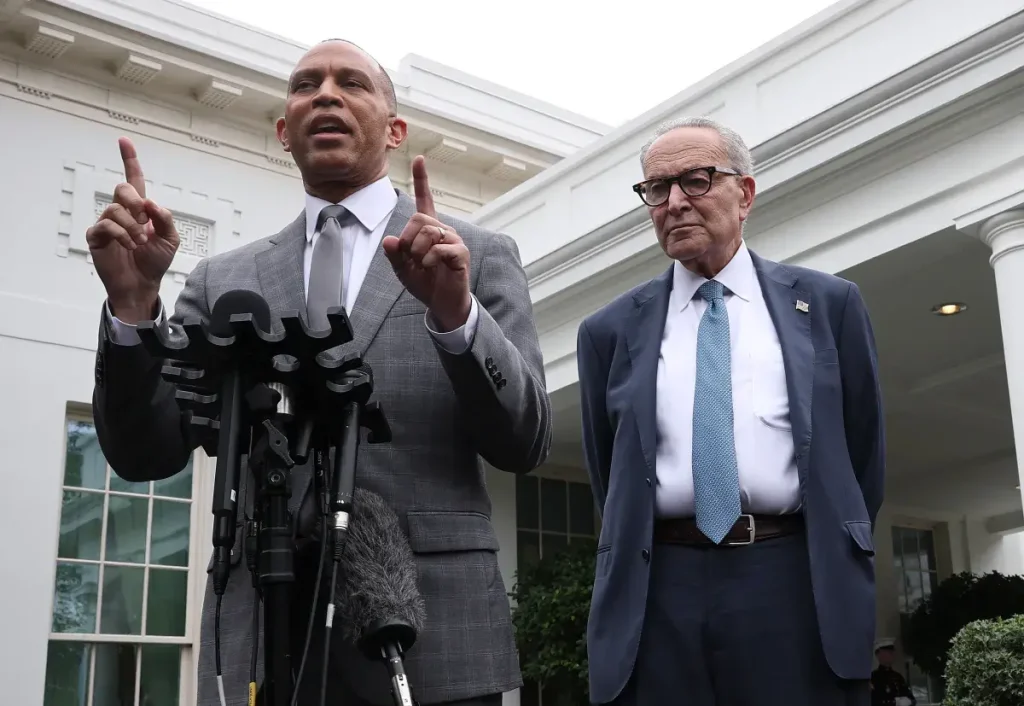Trump’s AI Mocking Video Underscores Government Shutdown Crisis
As the United States teeters on the edge of a government shutdown, President Donald Trump has escalated tensions by posting an artificial intelligence-generated video on his social media that mocks Democratic leaders and falsely claims they seek healthcare for undocumented immigrants. The controversial video shows a digitally altered Senate Democratic Minority Leader Chuck Schumer speaking at a podium alongside House Minority Leader Hakeem Jeffries depicted wearing a sombrero. In the fabricated clip, “Schumer” makes inflammatory statements suggesting Democrats are desperate for new voters and plan to provide free healthcare to undocumented immigrants to secure their support. The AI-generated content includes vulgar language and promotes harmful stereotypes, further inflaming an already tense political standoff as the Wednesday deadline for avoiding a shutdown rapidly approaches.
This digital mockery comes at a critical moment as high-stakes negotiations between Trump and congressional leaders recently ended in a stalemate. The core of the funding crisis revolves around healthcare policy disputes, though contrary to the video’s claims, undocumented immigrants remain ineligible for federally funded health coverage under both existing law and current Democratic proposals. The impasse threatens to disrupt federal operations nationwide and could jeopardize the income and benefits of thousands of government workers. Senator Schumer responded directly to Trump’s provocative post on social media platform X, writing: “If you think your shutdown is a joke, it just proves what we all know: You can’t negotiate. You can only throw tantrums.” This exchange highlights the deteriorating relationship between party leaders at a time when cooperation is desperately needed.
The timing of Trump’s inflammatory AI video couldn’t be more consequential as the nation faces a Wednesday deadline to reach a funding agreement. Government shutdowns have far-reaching consequences beyond the political theater in Washington—essential services become limited, national parks close, and federal employees face furloughs or working without immediate pay. The human cost is significant: families of government workers face financial uncertainty, citizens requiring government services experience delays or denials, and the broader economy suffers from decreased consumer spending and business uncertainty. What might seem like political posturing to those in power translates to real hardship for millions of Americans who depend on government functioning.
Beyond the immediate shutdown threat, this incident showcases the growing role of artificial intelligence in political discourse and its potential dangers. The ease with which Trump’s team created a convincing yet entirely fabricated video of political opponents making outrageous statements demonstrates how AI can be weaponized to spread misinformation. Many viewers might not immediately recognize the content as artificially generated, particularly when shared by a former president with millions of followers. This blurring of reality versus fiction in political communication presents profound challenges for maintaining an informed electorate and conducting good-faith policy debates. The technology that makes such realistic fakes possible has evolved faster than our societal guardrails against its misuse.
The substantive policy disagreement at the heart of the shutdown threat deserves attention beyond the distracting AI video. Democrats and Republicans remain divided on healthcare spending priorities, immigration policies, and the appropriate size and scope of government. These are legitimate areas for debate in a democracy, but the current political environment has made productive discussion nearly impossible. Lost in the inflammatory rhetoric and technological stunts are the real lives affected by these decisions—from federal workers wondering if they’ll receive their next paycheck to citizens dependent on government services for their wellbeing. The shutdown deadline requires an urgent resolution, yet leadership appears more invested in scoring political points than finding compromise.
As Wednesday approaches, the nation watches with concern as its leaders appear more interested in digital mockery than substantive negotiation. The use of AI to create false narratives about political opponents represents a troubling evolution in campaign tactics that threatens to further erode public trust in institutions and leadership. For the thousands of government workers and millions of Americans who will feel the impacts of a shutdown, these political games offer no solutions, only more uncertainty. The coming days will reveal whether cooler heads can prevail to keep the government operating, or if partisan division—now amplified by artificial intelligence—will once again bring federal operations to a costly halt. Beyond the immediate crisis lies a deeper question about how our democracy functions when technology makes it easier than ever to manipulate reality for political gain.















